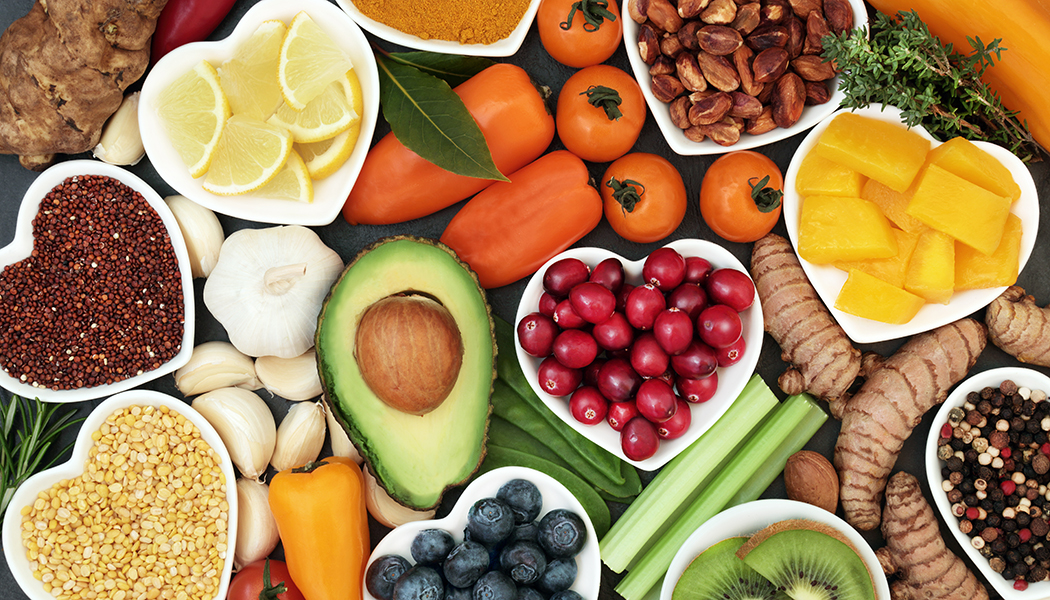According to the WHO, between 30-50% of cancers are preventable by healthy lifestyle choices and there are some foods that lower risk of cancer
The old saying that prevention is better than cure is particularly applicable in the case of cancer, as cancer is a deadly disease. The number of cancer patients is increasing rapidly across the globe.
Though the precise cause of cancer depends on cancer type, one of the leading causes is our sedentary lifestyle. The food we consume drastically affects many aspects of our health and is an integral part of our lifestyle. In the absence of the correct information, you are usually not consuming the right food to keep your body healthy and disease-free.
So, when we know that handling cancer is much more difficult than preventing it, the one aspect in our hands is eating the healthy and right food that can reduce the risk of cancer. You might have observed that every doctor in the world advocates for healthy eating habits.
Several studies have already been published that say higher intake of certain foods that lower risk of cancer as these foods contain beneficial compounds that help prevent cancer.
Let’s start with the foods that lower risk of cancer.
Foods that lower your risk of cancer.
1. Broccoli
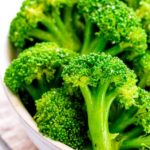
Broccoli contains sulforaphane that may have potent anti-cancer properties. This compound has been shown to cause tumor cell death and reduce tumor size in studies[1] thats why we consider broccoli as best foods that lower risk of cancer
A higher intake of cruciferous vegetables may also be associated with a lower risk of colorectal cancer[2].
2. Carrot
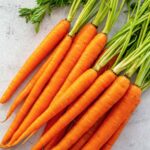
Some studies[3] have found an association between carrot consumption and a decreased risk of prostate cancer, lung cancer, breast cancer, and stomach cancer.
Carrots’ have the potential to fight cancer comes from being a non-starchy vegetable and a source of carotenoids and other phytochemicals.
Carotenoids act as antioxidants themselves and stimulate the body’s antioxidant defenses, decreasing free radical damage to DNA that can lead to cancer. This property makes carrot comes under foods that lower risk of cancer.
3. Beans
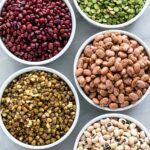
Beans are very rich in fiber, which may be protective against colorectal cancer.
Resistant starch and fermentable types of dietary fiber found in beans support the growth of healthful bacteria in the colon.
Studies[4], [5] have found that a higher intake of beans could reduce the risk of colorectal tumors and colon cancer.
4. Nuts
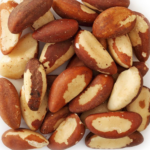
Some studies[6] have found that an increased intake of nuts may decrease the risk of cancer. Studies show that Brazil nuts and walnuts may also be linked to reducing the risk of cancer.
Emerging research also shows several compounds like Ellagitannins, melatonin, and gamma-tocopherol may each work through different paths to reduce oxidative stress, inflammation, and gene expression that can lead to cancer.
5. Citrus fruits
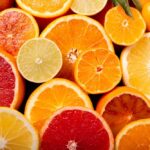
Studies[7, 8] have found that a higher intake of citrus fruits could decrease the risk of certain types of cancers, including pancreatic and stomach cancers, along with cancers of the digestive and upper respiratory tracts.
Vitamin C is a powerful antioxidant. In lab studies, it protects cells’ DNA by trapping free radicals, and it helps renew the antioxidant ability of Vitamin E. In cell studies, vitamin C also inhibits the formation of carcinogens and supports the immune system. This property makes citrus fruits comes under foods that lower risk of cancer.
6. Flaxseed
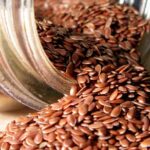
Some studies[9, 10, 11 ] have found that flaxseed may reduce cancer growth in breast and prostate cancers. It is also a rich source of fiber, which may be lowering the risk of colorectal cancer.
Flaxseed cancer prevention study is often focused on its ALA (alpha-linolenic acid) and lignans, although evidence is most apparent regarding its role as a source of dietary fiber.
Alpha-linolenic acid: Alpha-linolenic acid (ALA) is an omega-3 fat that our bodies convert into another omega-3 fat, called EPA (eicosapentaenoic acid). The EPA is a protective, anti-inflammatory compound.
Lignans: Lignans increase antioxidant, anti-inflammatory, and carcinogen-deactivating enzymes in cell studies. They also decrease the growth and increase the self-destruction of cancer cells.
This property makes flaxseed comes under foods that lower risk of cancer.
7. Garlic
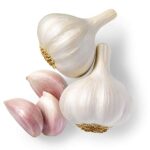
Allicin (produced from an enzyme released when the garlic tissue is damaged or crushed) in the garlic is a compound shown to kill cancer cells in studies.
Which have found that eating more garlic could decrease the risks of stomach, prostate, and colorectal cancers. [12 , 13 , 14]
- Prevents enzymes that activate carcinogens (cancer-causing compounds)
- Boosting enzymes that deactivate carcinogens
- Reducing inflammation that could support cancer development
- Supporting DNA repair
- Without affecting normal cells, it can slow the growth and stimulate self-destruction of cancer cells.
- Restricting cancer’s ability to multiple by decreasing a tumor’s ability to grow new blood vessels
This property makes garlic comes under foods that lower risk of cancer.
8. Berries
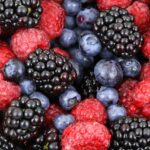
Berries are a very rich source of vitamins, minerals, and dietary fibers. There are a lot of studies done on berries due to their antioxidant properties and potential health benefits.
One study shows that anthocyanin, which is a compound in blackberries, lowers biomarkers for colon cancer.[15]
Another study[16] demonstrates that the anti-inflammatory effects of blueberries can prevent the growth of breast cancer tumors in mice.
As we study the foods that lower risk of cancer also there are some food that may be increase your risk of cancer
Food that may increase your risk of cancer
The food that may increase the risk of cancer are processed meat, overcooked foods, and fried foods items. This is because these food items may contain carcinogens or compounds that cause cancer.
1. Processed meat
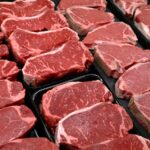
Red meats are processed meat. Some of the red meat examples are:
- Hot dogs
- Salami
- Sausage
- Ham
- Corned beef
- Beef jerky
The methods used to cook processed meats can create carcinogens.
According to a 2019 review[17], processed meat is a significant risk factor for colorectal cancer. A different 2019 review also found that it’s linked with stomach cancer.
In a 2018 review[18], researchers determined that high consumption of processed meat was associated with an increased risk of breast cancer.
2. Fried foods
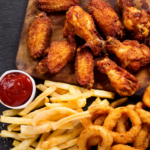
When starchy foods are cooked at high temperatures, a compound called acrylamide is formed. Frying, baking, roasting, and toasting food at very high temperatures create this compound.
Fried starchy foods are especially high in acrylamide, for example, fried potato products, like french fries and potato chips.
According to a 2018 review[19], acrylamide was found to be carcinogenic in studies done on rats. The International Agency for Research on Cancer (IARC) considers it “probably carcinogenic to humans.”
According to a 2020 study[20], acrylamide damages DNA and induces apoptosis or cell death.
Fried food also increases your risk for type 2 diabetes, and obesity is not eating in a controlled way. The taste of the fried food is good, so people cannot control themselves and overeat it.
These conditions can promote oxidative stress (imbalance between free radicals and antioxidants in your body) and inflammation, increasing your cancer risk.
3. Overcooking foods

Overcooking foods, especially meats, can produce carcinogens. According to one 2020 article[21], cooking meat with high heat creates carcinogenic PAHs and heterocyclic amines (HCAs). HCAs may have the capability to alter the DNA of your cells, which may increase the risk of cancer.
You’re more likely to overcook foods when you cook at high temperatures or over an open flame. This includes cooking methods like:
- Grilling
- Barbecuing
- Pan-frying
The Food and Drug Administration(FDA) also states that overcooking starchy foods, like potatoes, increases acrylamide formation, which is harmful to our health.
The method you can try to reduce your risk of carcinogens from high-heat cooking by using:
- Poaching
- Pressure cooking
- Baking or roasting at lower temperatures
- Slow cooking in a crockpot or slow cooker
4. Alcohol

The liver breaks down alcohol into acetaldehyde, which is a carcinogenic compound having the potential to cause cancer.
According to a 2017 review [22], acetaldehyde promotes DNA damage and oxidative stress. It also interferes with your immune function and creates malfunction so that your body cannot target precancerous and cancerous cells.
In women, alcohol increases estrogen levels in the body, according to a 2015 study [23]. This is linked with a higher risk for estrogen receptor-positive breast cancer. Alcohol produces carcinogens when your body metabolizes it.
If you want to reduce the risk for cancer, try to limit the consumption of these foods. Focus on healthy lifestyle habits
Conclusion
Preventing cancer is way better and easier than handling it. All you need to do is to limit the consumption of foods that can increase the risk of cancer.
Focus on healthy lifestyle habits which include adding foods to your diet that may lower your cancer risk, regular exercise, and finding ways to reduce your stress.
If you feel that we have missed out on any foods that lower risk of cancer in our list you can suggest us in the comment section below.


